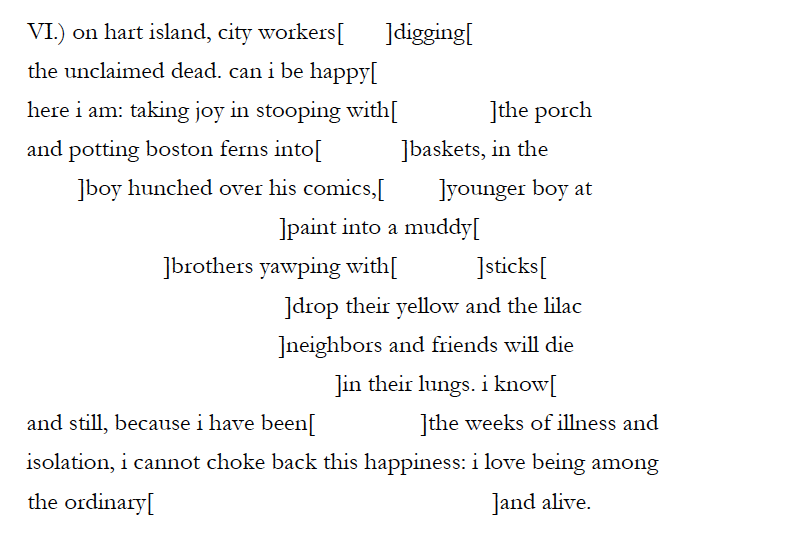Iain Haley Pollock
The narratives could not hold. My lived experience of COVID lockdown resisted the arcs of dramatic tension, intensification, and resolution. The warping of time during those months led to a haze in my memory that wouldn’t burn off. I couldn’t locate the specific, tangible details that lay at the foundation of my narrative poems. Absent these details and with that period so dissolute in my mind, after rounds of revision, I couldn’t get the narrative logic of these COVID poems to hang together.
Separately, I admire Sappho’s fragments in Anne Carson’s translation, If Not, Winter. The imaginative possibilities of the poems seem amplified in the lacunae. While many poets have influenced my poetics and my technique, when I stumble into a particular and intractable poetic thicket, I’m not in the practice of consciously turning to other writers for direction and usually wander until I find a path that brings me out of the brush. For this series of poems, however, realizing that my memories of the days of anxiety, Zoom, and social distancing had collected into a disjointed assemblage, I experimented with a fragmentary approach adapted from Carson’s renderings of Sappho.
I turned each narrative poem into a text block then redacted my own work according to rules—such as mirroring Sappho’s forms and including at least part of a recurring line that appears in each poem—rules that soon dissipated as more improvisatory approaches suggested themselves. Chiseling down the text blocks, I found my language recombining into new, strange, and unintended syntactic structures. That some of these structures made sense without quite making sense reflected my experience and memory of the “weeks of illness and isolation.” As the new syntax created its own meaning, I hoped that the poem’s bracketed “lacks”—as Carson calls them in Sappho—would create space for readers’ imaginative play. To the extent that COVID was a shared phenomenon, I wondered if readers might understand the experiences I gestured toward but excised and might fill the lacks with versions of their own narratives, similar but different than those intended in my original drafts. These narratives still could not hold, in a logical sense, but now they better reproduced the indelible fracture of my COVID existence.
< draft 1 >
Of Marks & Lacks (drafts)
III.) a worker grips a pesticide jug filled with disinfectant and sprays down carts after customers wheel them back curbside. his colleague walks down the line that wraps around the store’s corner, handing out plastic gloves to us who wait for food six feet from the bodies to front and back. twenty deep i started this shuffle to the grocer’s door—a long line but not desperate. and to occupy me: the norway and silver maples on the surrounding ridges coming into bud, their red swell all the more vivid against a sky that glowers a color somewhere between soviet housing block and raw steel. new leaves just pushing out, the trees allow clear sight lines to the taconic, to the trickle of cars headed south toward the city at what would have been, three weeks ago, morning rush hour, and to the lone house balanced on the hillside above the parkway. two spots ahead of me, a woman wears bright blue surgical gloves and a white dust mask fit for a demolition job. she’s been looking over her shoulder at a black toyota and, from time to time, waving. while we slouch forward, her husband unpacks their toddler from the backseat and keeping the girl a distance from the line, lets her run gleeful circles around an eroding tree bed, its mulch washed away over the winter. with her daughter outside the car, the woman waves across the lot as though she’ll never see the child again. three weeks ago, my eyes would have rolled at any one of these: the gloves, the mask, the histrionic waving. today, amid the weeks of illness and isolation, they stay fixed on the hillside. how long before nature runs its course, and the house surrounded by burgeoning maples gives way to gravity, loses its footing, and apex to foundation comes sliding, in a sudden thunder, down the slope?
VI.) on hart island, city workers are digging trenches for the unclaimed dead. can i be happy in times like these? but here i am: taking joy in stooping with naomi on the porch and potting boston ferns into hanging baskets, in the older boy hunched over his comics, in the younger boy at his easel slathering poster paint into a muddy brown. joy, later, in these brothers yawping with raised sticks in the yard, where the forsythia drop their yellow and the lilac burgeon into their color. neighbors and friends will die today with a tightness crushing in their lungs. i know this and still, because I have been amid these weeks of illness and isolation, i cannot choke back this happiness: i love being among the living and alive.
VIII.) amid the weeks of illness and isolation, the younger boy skulks nightly into our bed, climbs over the escarpment of his mother, and wedges himself into the narrow valley between her body and mine. in winter turning spring, light not yet limning east and ridge-line, i’d gather him across my forearms, blunder down the hall, and drop him back into his bed. wrapped in a frog blanket, his since birth, he’d shut-eye a few more hours, then back to our room and mattress. by early summer, i’d given up gathering him, let him lie with us, no matter the state of sky and light. on his most restless nights, he’d wrench his diminutive frame perpendicular to ours, his hard head pillowed on his mother’s waist, his feet slung over my hips, making of our bodies a crude letter, the h i tried to teach him during the day to recognize and, in his unsteady scrawl, to write. the weight of even his small calves pushed down onto my socket and joint kept me wandering in the borderlands of sleep. or just plain awake. awake and hearing the trundle and horn-blare of the first commuter trains hauling near-empty cars into the proud but intubated city.
< final version >
Of Marks & Lacks
[Sections III., VI., VIII.]




